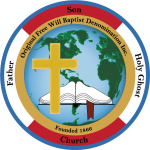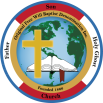History
 Conference History
Conference History
In 1866, the Cape Fear Conference (white) met at Bethsaida Baptist Church, Harnett County, North Carolina. It is to be noted that the Bethel Conference in Pitt County, North Carolina had already met the same year and made their decision regarding their black members. Brother B. B. Holder presented the following preamble regarding the colored members of their convention. Whereas, the political condition of the colored members of our connection has been changed, they having formerly been slaves and deprived of the privilege of preaching the gospel but now declared free by the authority of the United States, and no longer to be deprived of such a privilege; and, whereas; some of them applied to this conference for legal church authority, therefore; be it resolved; First, that if any colored member of our connection shall free divinely called take himself the public ministry, he have the liberty to apply to the church of which he is a member, grant him license to exhort among his own race.
Second, that if the licentiate shall prove worthy, sound in faith and doctrine, and shall promise usefulness in the course, then the pastor may, by the request of the church, proceed to a second examination; and if the candidate is found Orthodox, may set him apart to preach the gospel, administer its ordinances, receive members, raise up churches of their own color, to be held under the jurisdiction of this conference and governed by the same discipline.
Third, that the conference appoints a committee of three ministers to visit said churches, whose duty it shall be to ascertain the statistics of said churches and report annually.
Fourth, that such churches be represented in the annual conference by the committee having the oversight of them and enrolled in our minutes as the African Freewill Baptist Church.
These actions taken served as the foundation for the Original Cape Fear and Southwestern Free Will Baptist Annual Conference. While our documentation does not establish the official beginning of the Conference, “the first meeting was in 1867, of the Cape Fear Conference organized at Green Chapel Free Will Baptist Church in Harnett County near Lillington, NC with twenty-nine churches working together for the building of God’s kingdom,” two years after the end of the Civil War. “Green Chapel was organized under a brush shelter at a spot called Flat Swamp. It is the ancestor of practically all Free Will Baptist Churches in the conferences and is referred to as the “Mother Church” (taken from Mt. Nebo FWB Church First Anniversary of the 75th year 1988 in Lemon Springs near Sanford, NC). The churches continued in their relationship with the Cape Fear conference until 1891 when the supervision by the three-member committee ceased. In 1903, the conference joined with the Middle East and Northeast Conferences to form the General Conference of Original Free Will Baptists.
Worship services were initially held once a month, observing what was called pastoral Sunday. The pastor would preach on that day and his salary consisted of the offering received. Sunday school was held on other Sundays when the pastor could not be with the congregation often because of serving several churches. Churches then moved to having services twice a month, often on either the first and third or second and fourth Sunday. This arrangement made it easier for pastors to serve two churches twice a month and provide more continuity in the worship experience. As time passed, more churches began having worship services every Sunday, with youth and mission services being held on alternate Sundays when pastoral Sundays were not observed. The sister churches in the communities often supported one another because of the alternating Sunday schedules, strengthening the bond between the member churches.
At first, The Young People’s Christian League (YPCL) was started and founded by the late Sarah McLeod McDougald and late Robert Lee (Jake) McLeod at The Old Star of Hope Church, Jonesboro NC during the conference in 1935, which saw a need for an organization for young people to grow in the maturity of Christ. Next, the organization was presented as The Christian Endeavor. Then it was accepted and approved; however, the cabinet officials deemed it necessary to change to a more appropriate name, The Young People’s Christian League. The YPCL’s first meeting was held at the Sunday School Convention in 1936, Holiness Chapel, and Wade, NC. (Taken from the History of the Young People’s Christian League 1935-1995). As years went by, the YPCL had a convention of its own. Later, the Deacon Aide Brotherhood Society was organized (1966) as well with Trustees and meets annually along with their spouses. Over the years, the Conference established the Women’s Home Mission Convention in 1922 to further the cause of mission work and to save souls by sharing the gospel message. Therefore, the Women’s Home Mission Convention began as a part of the Annual Conference. Later it was moved to the weekend of the first Sunday in October. It also held a one-day session the Saturday before the third Sunday in July to fund-raise for the sick and needy. Sunday School Conventions were held in the Cape Fear and the Southwestern districts of the conference. The YPCL had two conventions as well. The Cape Fear Model Sunday School Convention was started by Sis Betty B. McKoy (Mt. Pisgah Harnett) in 1902. The Sunday school on that Sunday was to be a model and example to promote the teachings of the Bible stories, learning God’s purpose for your life, and to obtain salvation grace for the next life. To date it is 111 years strong.
Elder Lonnie McLean of Mt. Zion (Lee) instituted the Union Circle that was held each 5th Sunday in the respective areas. The Churches in the Lee County area would take turns hosting the Circle for fellowship and Spiritual growth. The Other area churches on the Cape Fear Side participated also.
This was around the late 1970’s, 1980’s ending with the early 1990’s.
Member churches are governed by the Book of Discipline which provides guidelines for the operation of the church and its auxiliaries. The Book of Discipline was revised in 1920, 1926, 1949, 1970, 1980 and 2000.
The Annual Conference is comprised of seventeen churches in North and South Carolina, with concentration in the Piedmont region of North Carolina and in Marlboro County in South Carolina. For many years the conference was led by moderators. Some of the moderators include: Rev. A. B. Massie, Rev. George Ewing, and. In 1968, the Original Free Will Baptist Church agreed to refer to its leader as Bishop and Bishop Ulysses Wade was our first Bishop (Minutes – 1970). In addition to Bishop Wade, Bishop Henry McLean, Bishop Cliffous S. Artis served as Presiding Prelate from 1989 until 2000. Our current leader, Bishop Reginald S. Hinton has served as Presiding Prelate from November 2000 until the present. Other Bishops include Vice-Bishops Clifton Rouse, Bishop Larry Ray, Bishop Curtis Thomas, Bishop Robert Murphy, Bishop Allan Smith, and our current Vice President, Bishop Frederick E. Clarida, Sr.
The Annual Conference is held during the week after the first Sunday in November. For many years it rotated between the member churches. Because of the lack of hotel accommodations in many cases, conference delegates would find lodging with church members in the community where the conference was being held. After conference attendance increased significantly, the smaller churches were no longer able to accommodate the attendees; consequently, it was held at specific churches for a number of years. Initially, Star of Hope began as a temporary headquarters; afterwards Lillington Grove OFWB Church hosted the conference for several years. Then it moved again to Star of Hope OFWB Church, Sanford, North Carolina to be the host church because of its size and its location in roughly the center of the conference field. Later, the Conference was held at the Cape Fear A Headquarters facility in Erwin, North Carolina. In 2004, the conference moved to Mount Pisgah Harnett Church in Erwin, North Carolina and remains there to the present.
